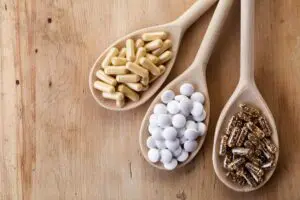Polycystic Ovary Syndrome (PCOS) is a common endocrine disorder affecting individuals assigned to females at birth. While it is widely recognized for its impact on reproductive health, one aspect that often goes underreported is the link between PCOS and low libido. Low libido, or reduced sexual desire, can significantly impact the quality of life for individuals with PCOS and their partners. In this blog post, we will explore the causes of low libido in PCOS and discuss effective treatment strategies to enhance intimacy.
Contents
- 1 What is the Relation Between Low Libido and PCOS?
- 2 Different Treatment Options for PCOS Low Libido
- 2.1 1. Lifestyle Modifications
- 2.2 2. Medications
- 2.3 3. Psychological Support
- 2.4 4. Sensate Focus and Intimacy Exercises
- 2.5 5. Nutritional Supplements
- 2.6 6. Acupuncture
- 2.7 7. Mindfulness and Yoga
- 2.8 8. Hormone Replacement Therapy (HRT)
- 2.9 9. Aromatherapy and Essential Oils
- 2.10 10. Pelvic Floor Physical Therapy
- 2.11 11. Herbal Supplements
- 2.12 12. Sexual Education and Counseling
- 2.13 13. Vibrational Therapy
- 3 Conclusion
What is the Relation Between Low Libido and PCOS?
One often overlooked aspect of PCOS is its potential impact on libido or sexual desire. The relationship between low libido and PCOS is multifaceted, involving hormonal, psychological, and lifestyle factors. Here’s an exploration of how PCOS can be associated with low libido:
Hormonal Imbalances:
- PCOS is characterized by an imbalance in sex hormones, including elevated levels of androgens (such as testosterone) and disrupted levels of estrogen and progesterone.
- Higher androgen levels, commonly associated with PCOS, can lead to a decrease in sexual desire in some individuals. Conversely, the imbalance in female sex hormones can also contribute to sexual dysfunction.
Insulin Resistance:
- Insulin resistance is a common feature of PCOS, where the body’s cells become less responsive to the effects of insulin, leading to elevated insulin levels in the blood.
- Insulin resistance can contribute to inflammation and hormonal disruptions, affecting the normal function of the ovaries and potentially impacting libido.
Irregular Menstrual Cycles:
- PCOS often causes irregular menstrual cycles due to disrupted ovulation. Menstrual irregularities can affect hormonal balance and contribute to changes in libido.
Psychological Factors:
- Dealing with the physical symptoms of PCOS, such as weight gain, hirsutism, and acne, can have a significant impact on self-esteem and body image.
- Chronic conditions like PCOS can lead to psychological distress, including stress, anxiety, and depression, all of which are known contributors to low libido.
Medication Side Effects:
- Some medications commonly prescribed for PCOS symptoms, such as hormonal birth control or anti-androgen medications, may have side effects that impact libido in certain individuals.
Chronic Health Condition Stress:
- Managing a chronic health condition like PCOS can be stressful, and stress itself is a well-known factor contributing to low libido. The emotional toll of dealing with a long-term condition may affect overall well-being, including sexual health.
Impact on Body Image:
- PCOS symptoms, such as weight gain and changes in physical appearance, can influence body image perception. Negative body image may contribute to a reduced sense of sexual desire and intimacy.
Understanding the connection between PCOS and low libido is crucial for individuals dealing with this condition.
Different Treatment Options for PCOS Low Libido
Addressing low libido in individuals with Polycystic Ovary Syndrome (PCOS) involves a multifaceted approach that combines lifestyle modifications, medications, psychological support, and complementary therapies. Here, we explore various treatment options tailored to address:
Conclusion
Managing low libido in PCOS requires a multifaceted approach that addresses both the physical and psychological aspects of the condition. By adopting lifestyle modifications, considering medication options, seeking psychological support, and incorporating intimacy exercises, individuals with PCOS can reclaim their sexual well-being and enhance the overall quality of their relationships. It’s important to consult healthcare professionals to develop a personalized treatment plan tailored to individual needs and circumstances. With the right strategies, individuals with PCOS can navigate the challenges of low libido and cultivate a fulfilling and satisfying intimate life.
If you are facing PCOS-related issues, PCOS treatment at HerMantra can help. Book your free trial online Pcos treatment session now.






